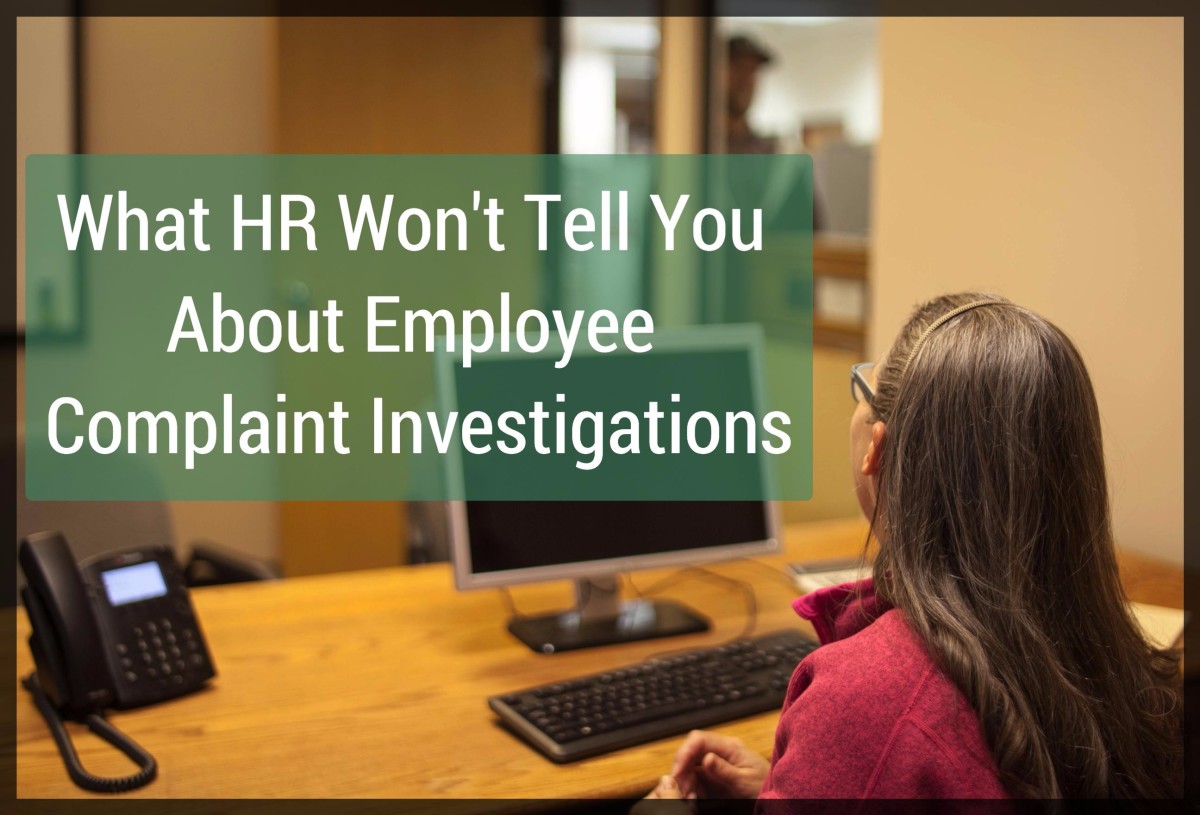Knowing Your Rights When You Are A Singled Out Employee
The Investigation
Once the first three criteria of the process has been met, there are still three more that must be met before an adverse action can be legitimately taken against an employee. (If you missed part 1 of this article, read it here)
4. Was a thorough investigation completed?
Before administering the discipline, management must make an investigation to determine whether the employee committed offense. They must ensure that they investigation is thorough and objective.
The majority of the time, they cannot convict you without your testimony. I'm going to repeat that. They usually cannot convict you without you incriminating yourself, so don't. Many times if a disruptive incident has occurred, they will call you and the parties involved into an office to do a discovery.
This questioning is supposed to be individual, as it violates your privacy rights for them to question you as a group, particularly if you feel intimidated by the presence of others.
However, they generally don't know what happened. They are questioning you to determine what happened, and whether or not they should discipline you for what happened. Therefore, it behooves you to treat the matter as one might treat an arrest. Exercise Miranda rights and don't speak without representation.
For those that don’t know, Miranda rights are the rights you exercise if you are arrested. These rights enable you to refuse to answer any questions, or incriminate yourself without the right of first seeking representation.
Unless that manager witnessed the incident, which most likely did not happen, they have to find out what happened. Anything you say can and will be used against you, but they don't tell you that. They act as if they are simply trying to find out what happened, and not like they are trying to find a party to discipline.
They may even go as far as to tell you that no discipline is pending. This may be true, at that exact moment, but that does not mean that discipline will not become a factor once they dot their i's and cross their t's in their investigation.

Are You A Writer?
If you are interested in making money online while writing? Hubpages is a great community to write in!
Know Your Rights
When you know your rights, and you remain silent, you may see your
manager lose their mind, and start threatening you. When I worked for
the post office, and I did this, they tried to write me up for
"behavior unbecoming a postal worker," insubordination, and anything
else they could dream up, but the bottom line is, you have the right to remain silent, and not incriminate yourself.
They
will lose their minds when you do this, because they assume your guilt
prior to even beginning their investigation, and attempt to intimidate
you during interrogation. They aren't going to do an investigation
without disciplining someone, so why incriminate yourself?
In this day and age, with job availability so scarce, you don't want to appear to be uncooperative, but at the same time, you must protect yourself as well.
A good idea, is to partner up with a reliable, trustworthy co-worker that you can refer to when you need a witness or representative (if you are without a union) to speak for you. If this "rep" explains your version of events or the situation, it is still third party information. You haven't incriminated yourself.
As long as you remember one key thing, you should be able to handle the situation without too much problems. The key is that you must, at all costs, remain calm and in control of your emotions.
Bear in mind that most managers want to get you riled up and emotionally upset, because that is how you spill the beans. If you react in your emotions, instead of responding by thinking things through with your brain, you will most likely lose in the end. Don't be defensive. Be assertive. Be calm. Cooperate as much as possible without self-incrimination.
Should the need arise to defend yourself against a disciplinary action, one position could be that your rep didn't correctly articulate the situation, and since you didn't speak, you still did not incriminate yourself in any way.
However, the better way to handle it is to wait until they have concluded their investigation, without giving them information. If, at that time, they conclude that they need to give you discipline, you have a "day in court" privilege.
This privilege means that employees have the
right to know with reasonable detail, what the charges are, and to be
given a reasonable opportunity to defend themselves before the
discipline is initiated.
Defending yourself does not mean that
you have to state what you may or may not have done. if you choose to
participate in this option, and I advise against it, simply question
them.
Demand to know how they came to the conclusions they came
to in pressing the charge. Take control of the conversation. Don't be
intimidated at the thought of probable disciplinary action. If you allow them to control the interrogation, you lose.
Don't
be belligerent. Just calmly state that prior to answering any
questions, you would like to know specifically, how the manager came to
the conclusions that you committed the offense being charged.
Remember, what they want is to get you emotionally riled up, because if they get you in your emotional realm, control will pass back over to them, and you will spout everything to hang yourself in anger. Don't fall for it.
If they state that there are witnesses, ask who they are, and how or why that person's word was considered valid. There's lots of good questions you can ask without giving up anything. You just need to strategize and take some time to think prior to meeting with them.
Reasonable
5. Was the severity of the discipline reasonably related to the
infraction itself and in line with that usually administered, as well
as to the seriousness of the employee's past record?
The following is an example of what arbitrators may consider an inequitable discipline.
If an installation consistently issues 5 day suspensions for a
particular offense, it would be extremely difficult to justify why an
employee with a past record similar to that of other disciplined
employees, was issued a 30 day suspension for the same offense.
There is no precise record of what establishes a "good," "fair," or
"bad" record. It seems this is only applicable to records, not people.
However, reasonable judgment must be used.
An employee's record of previous offenses may never be used to
establish guilt in a case you presently have under consideration; but
it may be used to determine the appropriate disciplinary penalty.

Timely
6. Was the disciplinary action taken in a timely manner?
Disciplinary actions should be taken as promptly as possible after the
offense has been committed. Be wary of a manager asking you to sign a
bunch of documentation that, obviously by date, has been neglected by
the manager. This means that the manager is rushing you now, because
their supervisor has inquired as to why certain things have not been
addressed by them.
If they bring you old (dated) paperwork to sign, even if you submitted
it, or asking you to resubmit it with a current date; be sure to keep
the old copy and don't allow them to take it, or be sure to sign the
outdated document with the current date, and not the old date. If you
don't, the manager's negligence may come back to haunt you at a later
date, and they may pass the blame for the lateness in processing on to
you.
Your manager may be a nice person, but that same nice person will put
your job on the line for their errors, so that their job is not on the
line, so bear that in mind and think, and protect yourself.
Always assess the situation, and read everything, especially if they
give you any documents to sign. Remember that any discussions a manager
wants to have with you must be done in private.
Please note that a discussion and being written up are two different
things. A discussion would be a warning about the infraction, and
again, is private. Therefore, a new manager will not have knowledge of
this if it was truly private.
It would be documented in the previous manager's private notes, and
should not be in the employee's personnel files or records. It is not
until they are written up for that infraction, that the notation of a
discussion comes into the personnel file, because the manager has to
support the write up.
It is believed that these discussions are not something that is
grievable, but that speaks only of the subject matter of the
discussion, and not the discussion itself. If the matter was not kept
confidential by the manager, it is indeed a grievable offense that the
employee can fight.
Take Notes
Additionally, if the purpose of the discussion is for it to be used as
an element of intimidation, then there is no just cause. If a private
discussion between you and another individual can be used against you
to further discipline, it stands to reason that the content of that
discussion is not truly private.
Therefore, it behooves you to take notes as well, so that you can
contest the content of the conversation should the need ever arise.
This is how you will help your case in proving whether or not the
manager had just cause for the action.
Although management cannot use these notes as an element of prior
adverse record in a subsequent disciplinary action against an employee;
they may be, where relevant and timely, relied upon to establish that
employees have been made aware of their responsibilities and
obligations.
Be aware that your employer may have more than one file on you, and
even if the notation or action is “removed from all records and files,”
if you are unaware of all the records and files, you can’t ensure that
can you?
You may need to check to find out all of the types of files that are
hidden on record about you as an employee. Aside from your OPF, or
official personnel file, there could be a hiring file, a discipline
file, a supervisor’s file, a manager’s file, and on and on. It’s your
job to find out, to ensure that the proper expunging occurred.
In my last job, I was given a write up for an error that happened 3
weeks prior to being notified about the write up. By that time, I had
no idea of what my supervisor was talking about and it was difficult to
defend myself due to the onslaught of work we had. That is not an
example of timely action.
All of these things have to be done in a timely manner. You cannot wait
until a year later to check on this, because for one thing; you may
have already been adversely affected by a failure to act on
management’s part, or by further action against you.
Sandra M Urquhart
Massage Therapist/Writer
For links to more articles check out:
http://www.sandramurquhart.com & my new website: http://www.issuesinyourtissuesmassagetherapy.com
My Book/Ebook
Dear Child Of God
-
A little book of total scriptural encouragement for all people. Its full of words of comfort for those times when we are going through trials and hardships that we just cannot control. There is hope and healing for the hurting heart and this book provides the assurance of God's providence and a future beyond heartache.
-
Smashwords — Dear Child Of God — A book by Sandra Urquhart
-
If God were to write a letter of scriptural comfort to you during any crisis or difficulty you faced, this would be it. This letter of love was written for a friend in just such a crisis. The scriptures it contains are words of comfort, not condemnation.
Amazon.com: Dear Child Of God (9781438221151): Sandra M. Urquhart: Books
Amazon.com: Dear Child Of God (9781438221151): Sandra M. Urquhart: Books













